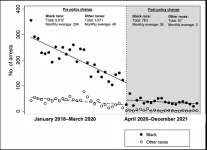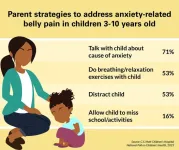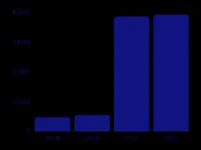(Press-News.org) Scientists have long struggled to find the best way to present crucial facts about future sea level rise, but are getting better at communicating more clearly, according to an international group of climate scientists, including a leading Rutgers expert.
The consequences of improving communications are enormous, the scientists said, as civic leaders actively incorporate climate scientists’ risk assessments into major planning efforts to counter some of the effects of rising seas.
Writing in Nature Climate Change, the scientists review the language and graphics used in climate “assessment” reports between 1990 and 2021 by members of the United Nations’ Intergovernmental Panel on Climate Change (IPCC).
“Future sea level rise emerges from a lot of different processes,” said Robert Kopp, a lead author of the study and a professor in the Department of Earth and Planetary Sciences at the Rutgers School of Arts and Sciences. “The challenge is that, for some of those processes we understand the physics quite well – for example, how the ocean takes up heat and expands in response to that – and so can quantify and convey those risks. But other processes, particularly some of those acting on ice sheets, involve factors we don’t understand that well and that are difficult to put into quantitative terms, but might nonetheless be able to cause rapid sea-level rise.”
This means, statistically speaking, future sea level change is characterized by two different types of uncertainty, said Kopp, who is the director of the Megalopolitan Coastal Transformation Hub, a 13-institution, National Science Foundation-funded partnership led by Rutgers, and co-director of the Rutgers Office of Climate Action.
“There’s quantifiable uncertainty, which can be measured and presented with a degree of confidence,” he said, “and then there’s ambiguity, a form of deep uncertainty that cannot be well represented quantitatively.”
The analysis shows aspects of sea level rise where the level of risk could be quantified have been presented accurately, informing public bodies effectively.
But when conveying sea level uncertainties that have been and remain difficult to quantify, the language in the reports often has fallen short, either oversimplifying projections or conveying the information in a confusing manner, according to the analysis. Such language could lead policymakers to neglect the risks associated with possible high-end, sea-level outcomes.
Ambiguity arises in situations in which analysts can interpret a common set of facts in highly divergent ways – or can’t interpret them at all, Kopp said.
“Sea level projections extending only a few decades into the future and under lower emissions scenarios exhibit less ambiguity than do projections in the longer term and under higher emissions scenarios,” he said.
The study contrasts the language used to convey ambiguities in the risk of late-century sea level rise in the IPCC reports in 1990, 1995, 2001, 2007, 2013 and 2021, along with the UN’s Special Report on the Ocean and Cryosphere in a Changing Climate issued in 2019.
In the First Assessment Report, released in 1990, the authors characterized a rapid disintegration of the West Antarctic Ice Sheet because of global warming as “unlikely in the next century.”
In contrast, in the Sixth Assessment Report, published in 2021, scientists warn that higher rates of sea level rise before 2100 could be “caused by earlier-than-projected disintegration of marine ice shelves, the abrupt, widespread onset of marine ice sheet instability and marine ice cliff instability around Antarctica.”
The report goes on to explain that the processes are characterized by “deep uncertainty.” It concludes: “In a low-likelihood, high-impact storyline, under high emissions such processes could in combination contribute more than one additional meter of sea level rise by 2100.”
Communicating complex risk scenarios to the public in an effective manner is an ongoing process. If the approach taken in the most recent climate report in 2021 is successful, it will be accurately reflected in future regional assessments and will ultimately be judged by policymakers, along with climate and social scientists.
It matters that scientists get it right, the study concludes.
“The presence and magnitude of ambiguity in sea-level projections can affect how planners make decisions, and thus is important to communicate clearly and effectively,” Kopp said.
Kopp led the study with Jessica O’Reilly, an anthropologist at Indiana University Bloomington who studies the IPCC, and Michael Oppenheimer, a Princeton University climate scientist who has served with the IPCC since the First Assessment Report.
The other authors in the study, all of whom were involved with the Sixth Assessment Report, include those from Brown University and the University at Buffalo in the U.S., as well as others in China, France, Germany, Great Britain, the Netherlands, New Zealand and Singapore.
END
Assessment of how climate scientists communicate risk shows imperfections, improvements
The hardest part, experts find, is communicating “unquantifiable” uncertainty
2023-06-19
ELSE PRESS RELEASES FROM THIS DATE:
De facto decriminalization of drug possession reduces the overall arrest toll on the Black community, although racial disparities persist
2023-06-19
Ann Arbor, June 19, 2023 – De facto decriminalization of drug possession may be a good first step in addressing the disproportionate impact of an overburdened United States criminal justice system on the Black community. According to a new study in the American Journal of Preventive Medicine, published by Elsevier, this strategy was associated with significant and sustained reductions in low-level arrests. These arrests too often prevent drug users from obtaining needed treatments and services. The findings also suggest that while these policies may effectively reduce the overall arrest toll, striking disparities persist in how police are applying the directives across racial ...
Combatting stress to improve the heart health of the Hispanic/Latino community
2023-06-19
Embargoed until 8am Eastern Time on Monday, June, 19, 2023
DALLAS, June 19, 2023 — Constant or chronic stress can affect overall well-being and may even impact heart health. Chronic stress can lead to increased blood pressure, heart rate and inflammation, which can contribute to developing chronic diseases.[1] The American Heart Association, the leading global voluntary health organization dedicated to fighting heart disease and stroke for all, today launches a new campaign to help the Hispanic/Latino community protect its overall well-being by addressing common stressors that ...
Bridging traditional economics and econophysics
2023-06-19
How do asset markets work? Which stocks behave similarly? Economists, physicists, and mathematicians work intensively to draw a picture but need to learn what is happening outside their discipline. A new paper now builds a bridge.
In a new study, researchers of the Complexity Science Hub highlight the connecting elements between traditional financial market research and econophysics. "We want to create an overview of the models that exist in financial economics and those that researchers in physics and mathematics have developed ...
1 in 6 parents say child reports tummy pain at least monthly but many haven’t consulted with a doctor
2023-06-19
ANN ARBOR, Mich. – Tummy aches are common among kids, with one in six parents in a new national poll saying their child experiences them at least once a month.
But not all parents seek professional advice when belly pain becomes a regular occurrence and just one in three are sure they’d know when it might be a sign of a serious problem, according to the University of Michigan Health C.S. Mott Children’s Hospital National Poll on Children’s Health.
“Tummy complaints are common among children. This type of pain may be a symptom for a range of health issues, but it can be difficult to know if it’s ...
Pandemic took a major, prolonged toll on university students’ mental health, finds study
2023-06-19
Undergraduates at UK universities experienced prolonged and high levels of psychological distress and anxiety during the pandemic, according to a new study, tracking wellbeing over the course of 2020 to 2021.
They also reported significantly lower levels of wellbeing, happiness and life satisfaction compared to pre-pandemic levels.
Published in the British Journal of Educational Studies, the University of Bolton research highlights how the stringent lockdown measures – including ...
Significant acceleration of humanities and social sciences open access through Taylor & Francis and Jisc Transformative Agreement
2023-06-19
The power of transformative agreements (TAs) to drive the transition to open access (OA), especially in the Humanities and Social Sciences, is revealed in a new report published by Taylor & Francis. Accelerating open access in the UK explores in detail the first two years of Taylor & Francis’ OA partnership with the Jisc consortium and how it has boosted the global impact of research from UK institutions.
Supporting Humanities and Social Sciences researchers to publish OA
One of the report’s standout findings is the benefit of the TA for Humanities and Social Science ...
A probiotic could help mitigate mercury absorption in the gut
2023-06-18
Houston, TX – New research by a team at Pennsylvania State University suggests that microbes in the human gut could be harnessed to block absorption of toxic metals like mercury and help the body absorb useful nutritional ones, like iron. The group presents their findings at ASM Microbe 2023, the annual meeting of the American Society for Microbiology.
Methylmercury, a neurotoxin, is particularly worrisome, said Daniela Betancurt-Anzola, a graduate student at Penn State who led the new study. It ...
An oral probiotic can treat dry eye disease
2023-06-18
Houston, TX – In a study by a research group at Baylor College of Medicine, oral administration of a commercially available probiotic bacterial strain was found to improve dry eye disease in an animal model. The findings were presented at ASM Microbe 2023, the annual meeting of the American Society for Microbiology.
Dry eye, a common condition in which tears produced by the eye can’t keep the eye adequately lubricated, afflicts approximately 1 in 20 people in the United States. It can cause eye stinging and burning, inflammation, blurry vision and light sensitivity. Extreme cases can result in damage ...
People with alcohol use disorder impaired after heavy drinking, despite claims of higher tolerance
2023-06-18
While heavy drinkers can tolerate a certain amount of alcohol better than light or moderate drinkers, the concept of “holding your liquor” is more nuanced than commonly believed, according to new research from the University of Chicago.
The researchers conducted the study with three groups of young adults in their 20s with different drinking patterns. They found that drinkers with alcohol use disorder (or AUD, traditionally known as alcoholism) displayed less impairment on fine motor and cognitive tasks than light or heavy social drinkers after consuming a standard intoxicating dose—equivalent ...
Social isolation linked to reduced bone quality in males, mouse study finds
2023-06-18
Social isolation may negatively impact bone health, suggests a study conducted in mice being presented Sunday at ENDO 2023, the Endocrine Society’s annual meeting in Chicago, Ill.
“Social isolation is a potent form of psychosocial stress and is a growing public health concern, particularly among older adults,” said lead researcher Rebecca Mountain, Ph.D., of MaineHealth Institute for Research in Scarborough, Maine. “Even prior to the onset of the COVID-19 pandemic, which has significantly increased the prevalence of isolation and loneliness, researchers have been concerned about a rising ‘epidemic ...
LAST 30 PRESS RELEASES:
Fecal transplants from older mice significantly improve ovarian function and fertility in younger mice
Delight for diastereomer production: A novel strategy for organic chemistry
Permafrost is key to carbon storage. That makes northern wildfires even more dangerous
Hairdressers could be a secret weapon in tackling climate change, new research finds
Genetic risk for mental illness is far less disorder-specific than clinicians have assumed, massive Swedish study reveals
A therapeutic target that would curb the spread of coronaviruses has been identified
Modern twist on wildfire management methods found also to have a bonus feature that protects water supplies
AI enables defect-aware prediction of metal 3D-printed part quality
Miniscule fossil discovery reveals fresh clues into the evolution of the earliest-known relative of all primates
World Water Day 2026: Applied Microbiology International to hold Gender Equality and Water webinar
The unprecedented transformation in energy: The Third Energy Revolution toward carbon neutrality
Building on the far side: AI analysis suggests sturdier foundation for future lunar bases
Far-field superresolution imaging via k-space superoscillation
10 Years, 70% shift: Wastewater upgrades quietly transform river microbiomes
Why does chronic back pain make everyday sounds feel harsher? Brain imaging study points to a treatable cause
Video messaging effectiveness depends on quality of streaming experience, research shows
Introducing the “bloom” cycle, or why plants are not stupid
The Lancet Oncology: Breast cancer remains the most common cancer among women worldwide, with annual cases expected to reach over 3.5 million by 2050
Improve education and transitional support for autistic people to prevent death by suicide, say experts
GLP-1 drugs like Ozempic could cut risk of major heart complications after heart attack, study finds
Study finds Earth may have twice as many vertebrate species as previously thought
NYU Langone orthopedic surgeons present latest clinical findings and research at AAOS 2026
New journal highlights how artificial intelligence can help solve global environmental crises
Study identifies three diverging global AI pathways shaping the future of technology and governance
Machine learning advances non targeted detection of environmental pollutants
ACP advises all adults 75 or older get a protein subunit RSV vaccine
New study finds earliest evidence of big land predators hunting plant-eaters
Newer groundwater associated with higher risk of Parkinson’s disease
New study identifies growth hormone receptor as possible target to improve lung cancer treatment
Routine helps children adjust to school, but harsh parenting may undo benefits
[Press-News.org] Assessment of how climate scientists communicate risk shows imperfections, improvementsThe hardest part, experts find, is communicating “unquantifiable” uncertainty


